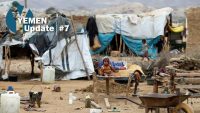Preventing Further Conflict and Fragmentation in Ethiopia
High-profile assassinations, intercommunal violence and the question of Sidama statehood have endangered Ethiopia’s transition to a multi-party democracy. In this excerpt from its Watch List 2019 – Second Update, Crisis Group urges the European Union and its member states to support a parliamentary vote and assist with economic reforms.
This commentary is part of our Watch List 2019 – Second Update.
Ethiopia is being buffeted by deadly unrest as it attempts a rapid transition to multi-party democracy under Prime Minister Abiy Ahmed. His government has chalked up significant achievements during the last eighteen months of political and economic liberalisation. But the challenges it faces were laid bare on 22 June when the president of one of the country’s regional states, Amhara, and the Ethiopian military’s chief of staff were assassinated in concurrent events in separate cities.… Seguir leyendo »













